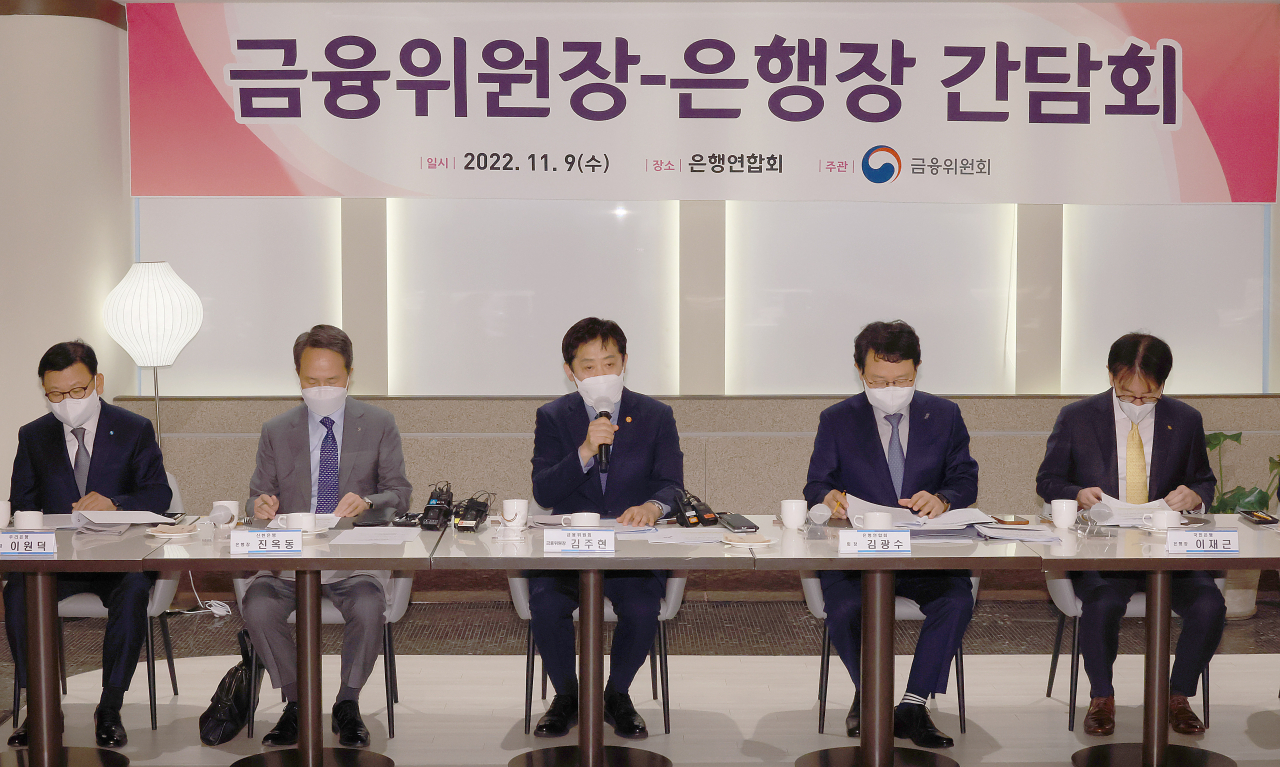Regulator to ease bank capital rules amid liquidity concerns
By Choi Si-youngPublished : Nov. 9, 2022 - 18:50

South Korea’s top financial regulator on Wednesday eased capital rules for banks seeking to contribute to the government-led fund aimed at stabilizing the local bond and stock markets, in a bid to contain the spillover of liquidity stress.
A local insurer’s decision two days ago to reverse its postponement of redeeming its dollar bonds worth $500 billion after being pressured to meet the original deadline had added to growing volatility gripping the bond and short-term money markets. A default a state-backed local developer reported in early October had forced the government to tap into the fund put together by local financial institutions.
Loosening the bank capital ratio -- a yardstick of solvency measuring capital against risk-weighted assets including those taken out for the fund -- helps banks to maintain their capital flow with minimal disruptions.
“We expect banks to lead the way in restoring market calm. … Our efforts, along with banks', could be a big help for the stability of the wider financial market,” Chairman Kim Joo-hyun of the Financial Services Commission, the regulator, said at a meeting with the leaders from 20 local banks and a group representing them, the Korea Federation of Banks.
Kim Kwang-soo, the KFB chief, said banks will boost liquidity by buying commercial paper, asset-backed commercial paper and repurchase agreements, or repos. The volume of bank bonds to be issued by year-end will be kept to a minimum to prevent them from “crowding out” the wider debt market as investors chase safer money guaranteed by the government or institutions in similar standing, Kim added.
State-run companies in the meantime would also take out bank loans instead of issuing bonds, the regulator said in response.
Wednesday’s meeting, held just a week after Kim met with leaders of the country’s five banking giants to address growing credit strains, highlighted economic woes facing Asia’s fourth-largest economy.
Exports in October fell the most in 26 months while a trade deficit persisted for a seventh month, the longest stretch since 1997, the same year the International Monetary Fund approved a bailout for Korea. The local currency is hovering near its weakest level in over 13 years against the US dollar.
And consumer inflation running at a 24-year high is the most pressing challenge to deal with, according to policymakers in Seoul, who say the country, however, is “doing well” riding out global headwinds including inflation.
Later this month, the Bank of Korea is expected to deliver another interest rate hike, taking the current 3 percent -- already a 10-year high -- to at least 3.25 percent. The central bank has been raising borrowing costs since August last year to stem the price surge that it says will irreversibly cut the economy’s growth momentum if it is left uncontained.






![[From the Scene] Monks, Buddhists hail return of remains of Buddhas](http://res.heraldm.com/phpwas/restmb_idxmake.php?idx=644&simg=/content/image/2024/04/19/20240419050617_0.jpg&u=20240419175937)








![[From the Scene] Monks, Buddhists hail return of remains of Buddhas](http://res.heraldm.com/phpwas/restmb_idxmake.php?idx=652&simg=/content/image/2024/04/19/20240419050617_0.jpg&u=20240419175937)

![[KH Explains] Hyundai's full hybrid edge to pay off amid slow transition to pure EVs](http://res.heraldm.com/phpwas/restmb_idxmake.php?idx=652&simg=/content/image/2024/04/18/20240418050645_0.jpg&u=20240419100350)

![[Today’s K-pop] Illit drops debut single remix](http://res.heraldm.com/phpwas/restmb_idxmake.php?idx=642&simg=/content/image/2024/04/19/20240419050612_0.jpg&u=)